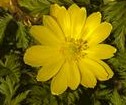 This native of Japan and Manchuria is a herbaceous perennial and member of the buttercup family, Ranunculaceae, that also includes anemone, delphinium, and hellebore. It has many branched stems bearing three to six inch long triangular leaves that are ternately compound. The flowers appear singly in spring and are two inches across with twenty to fifty petals each. Although usually yellow, the petals may be white, rose, or have red stripes. Pheasant’s eye needs six weeks of temperatures below 40 F for the rhizomes to break dormancy in spring and often blooms as early as February. Plants go dormant again by mid-summer so planting plans should include selections to cover the bare spot that is created. A good choice for rock gardens or front of the border but should be massed for a good floral display.
This native of Japan and Manchuria is a herbaceous perennial and member of the buttercup family, Ranunculaceae, that also includes anemone, delphinium, and hellebore. It has many branched stems bearing three to six inch long triangular leaves that are ternately compound. The flowers appear singly in spring and are two inches across with twenty to fifty petals each. Although usually yellow, the petals may be white, rose, or have red stripes. Pheasant’s eye needs six weeks of temperatures below 40 F for the rhizomes to break dormancy in spring and often blooms as early as February. Plants go dormant again by mid-summer so planting plans should include selections to cover the bare spot that is created. A good choice for rock gardens or front of the border but should be massed for a good floral display.
.
Type: Herbaceous perennial
Bloom: Single flowers in early spring with twenty to fifty petals, usually yellow, but may be rose, white, or with red stripes;
Size: 9-12” H x 12” W
Light: Full sun with afternoon shade in the South
Soil: Average, moderately moist, well-drained
Hardiness: Zones 4-7
Care: Low maintenance
Pests and Diseases: Slugs
Propagation: Seed, division in spring
Companion plants: Early iris, crocus, spring bulbs
Outstanding Selections:
‘Flora-plena (double form)
‘Fukuju Kai’ (earliest variety to bloom)